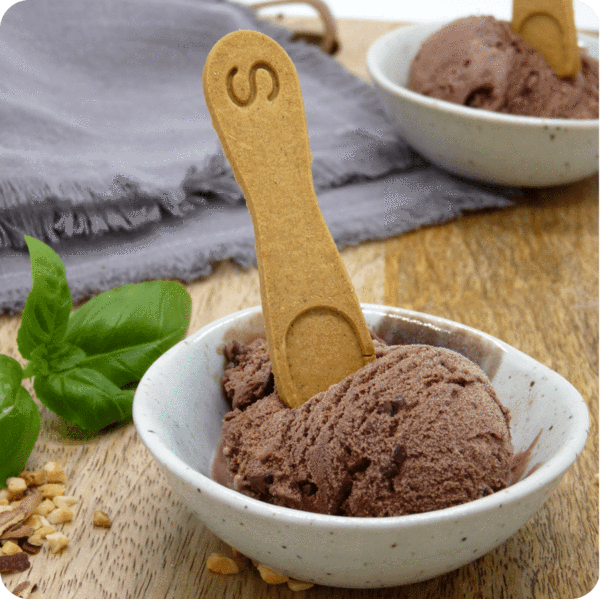Case 9.2: Spoontainable - edible ice cream spoons - Germany
Name of the company: Spoontainable
Country: Germany
Size of the business: 7 employees
Website: https://spoontainable.com/
Background
The founders met at the University of Hohenheim at the end of 2017 where they were studying plastic alternatives. Whilst eating ice cream they got the idea of the edible spoon, as they realized that it would be super convenient to also be able to eat the spoon. Afterwards, they tested their idea in their shared kitchen, starting with plain cookie dough and developing their first prototypes in that very kitchen. They noticed that the plain cookie dough wouldn’t work. After several different trials, the skin of cocoa seeds, the waste created by the chocolate industry, was found to be a suitable option. By baking the ‘choco-waste‘ into their dough they created an alternative to plastic and have contributed to finding a super sustainable use for food waste for a more circular economy.
In the beginning, founders were driven by the curiosity, but the products also were very well received by the clients, and there is a great societal interest in sustainability. Additionally, the plastic-ban for 2021 provided a good opportunity for building the business. The entrepreneurs saw their chance to show that small changes can have great impact and therefore they held on to their product. The oat husks are purchased regionally. The processing into fibres takes place in Poland.
Main activities
The company’s revenue model relates only to the development and sale of edible ice cream spoons.
Market
In the start-up phase, the entrepreneurs sold their products by personal direct sales by visiting and introducing their spoons to ice cream parlours. Through the personal contact, it was much easier to present their new and unusual product that required many explanations.
At present, the enterprise has a wide range of customers such as classic ice cream parlours, cafes or food trucks at festivals selling ice cream, frozen yoghurt and bubble waffles. The cafes benefit from offering a sustainable alternative and thus attracting more customers. Many parlours integrate the price of the spoon into the final price. Others take a so-called small ‘environmental fee’ to be paid extra by the guests if they decide for the more expensive alternative. Therefore, in the end it is the decision of the consumer.
Caterers have also been a very interested segment. They sell their products directly to traders who then include them into their portfolios, which are presented to their restaurateurs. That is how the trading system in Germany works.
Enterprise is currently working on a deal with a big supermarket chain, so they expect to start selling their products through retail chains soon, and with integrating their products into retail, they are trying to reach a larger customer base.
Enterprise also is currently maintaining a website and an online shop, which works more or less automatically. Enterprise is very active on social media, because it is a good way for reaching out to end consumers and raise awareness about the products and sustainability.
Enterprise has applied for patent and has their trademark protected. There are some imitators, but so far those have not offered better products. The enterprise has sustainable value chain and a strong unique selling point with their cocoa skin residues and fibres from the food industry.
Challenges and solutions
Their goal is to become the market leader in the area of sustainable -alternatives to plastics for the gastronomy sector. Which means working on and launching a bunch of new products. Currently, the enterprise is developing stirring sticks for coffee, small forks, a whole cutlery set, which will be launched soon. This will require a new production and additional research. Enterprise is already selling the spoons in ten different countries and would like to expand to outside of the EU markets.
Enterprise is in a very good position thanks to the plastic ban. Since they not only use the skin of the cocoa seed but also oat husks there is no shortage of raw materials. On the one hand, the food industry is full of wasted peels, husks and skins, which can be processed into fibres that can be used in their products. Moreover, the market is growing creating demand for this kind of products.
Funding
The entrepreneurs founded the company whilst studying in the university and without having savings or other capital. Therefore, they started a crowd funding campaign, which allowed them to finance the first production of the spoons. For further financing, bank loan was used and later the revenues from selling spoons was used for financing. For further growth and optimization, another investment has been made recently.
What makes this case innovative?
Case represents a smart production innovation based on recycling food industry waste. The basis for their edible ice cream spoons is 100% sustainable raw materials as the enterprise uses biogenic residuals from the food industry. Therefore, they create a sustainable value chain for edible spoons that has no food waste, the products are suitable for vegans and plastic free.
Other related Business Cases
Case 9.1: Kaffeeform – coffee cups made from coffee grounds – Germany
Case 12.1: Greve Biogass – biogas from agricultural and municipal waste and sewage – Norway

